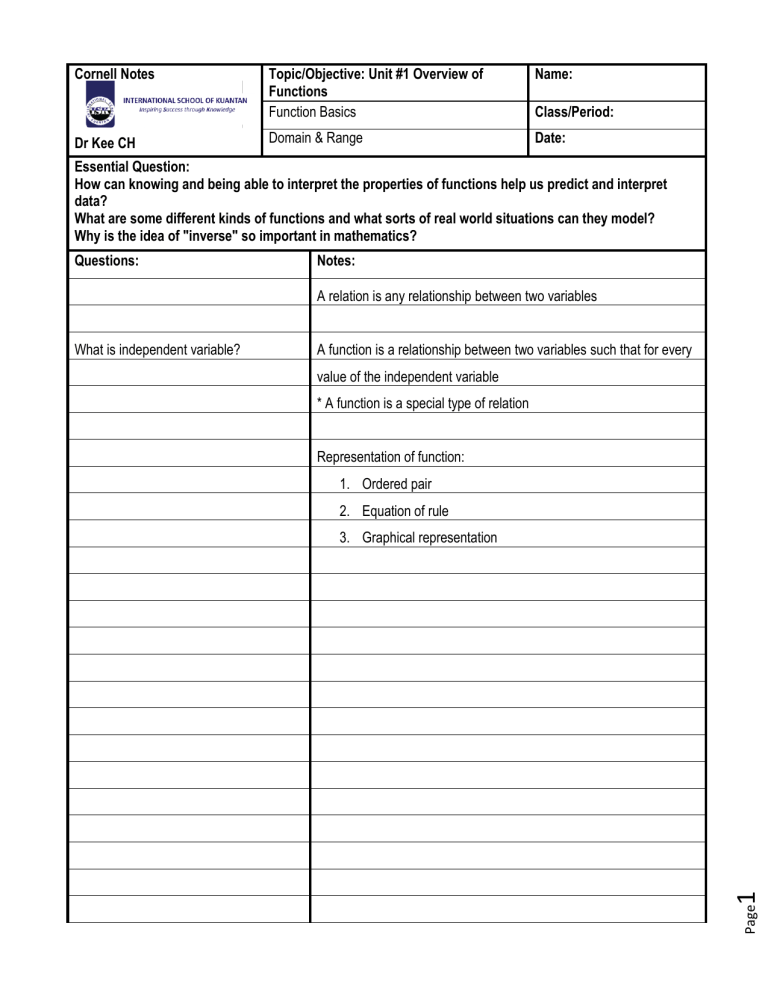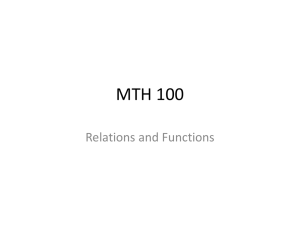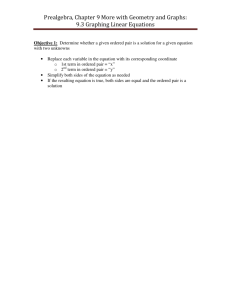
Cornell Notes
Dr Kee CH
Topic/Objective: Unit #1 Overview of
Functions
Function Basics
Name:
Domain & Range
Date:
Class/Period:
Essential Question:
How can knowing and being able to interpret the properties of functions help us predict and interpret
data?
What are some different kinds of functions and what sorts of real world situations can they model?
Why is the idea of "inverse" so important in mathematics?
Questions:
Notes:
A relation is any relationship between two variables
A function is a relationship between two variables such that for every
value of the independent variable
* A function is a special type of relation
Representation of function:
1. Ordered pair
2. Equation of rule
1
3. Graphical representation
Page
What is independent variable?
Domain values are called inputs, and
Form 1: Ordered Pairs
range values are called outputs.
A function is a set of ordered pairs such that no two different ordered
pairs have the same first coordinate.
Domain : set of all first coordinates of the ordered pairs in the function.
Range :set of all second coordinates of the ordered pairs in the function.
Example:
Determine which of the two sets is a function and identify the
domain and range of the function.
f = {(4, 1), (3, 7), (2, 5), (5, 5)} w = {(5, 1), (4, 3), (6, 3), (4, 2)}
Suggestion:
Answer:
When listing the elements of the domain
Set f is a function because no ordered pairs have the same first
and range of a function, put the elements
coordinate.
in numerical order
Set w is not a function because (4, 3) and (4, 2) have the same first
coordinate, but different second coordinates.
The domain of f is D = {2, 3, 4, 5} and the range of f is R = {1, 5, 7}.
Your turn:
Problem Identify the domain and range of the function
Page
2
g = {(1, 2), (2, 3), (3, 4), (4, 5), …}.
The rule is normally an equation in two
Form 2: Equation or Rule
variables
A function is a rule of correspondence between two sets A and B
Ex:
such that each element in set A is paired with exactly one element in
In equations of the form y = 3x + 5, x is
set B.
called the independent variable, and y is
called the dependent variable.
To determine the domain, start with the real numbers and exclude all
values for x, if any, that would make the equation undefined over the
All real numbers =
real numbers
Example 1: State the domain of the function
3
𝑦=
𝑥−1
Step 1. Set the denominator equal to 0 and solve for x.
x−1=0
x=0+1
x=1
Step 2. State the domain.
The domain is all real numbers except 1.
Your turn:
3
State the domain of the function 𝑦 = √𝑥 − 2 + 5
Page
𝐷𝑜𝑚𝑎𝑖𝑛: 𝑥 ∈ ℝ, 𝑥 ≠ 1
think of x as being an input value and f(x)
A convenient notation for a function is to use the symbol f(x) to
as being an output value.
denote the value of the function f at a given value for x.
Ex:
𝑦 = 3𝑥 + 5 can be written as 𝑓(𝑥) = 3𝑥 + 5
Your turn:
Problem Find the values of the function 𝑔(𝑥) = √𝑥 − 3 + 2𝑥
at the given x value
a. 𝑥 = 4
b. 𝑥 = 1
4
c. 𝑥 = 8
Page
where 𝑦 = 𝑓(𝑥)
Form 3: Graphical Representation
You can easily determine whether a graph is the graph of a function
Page
5
by using the vertical line test.

